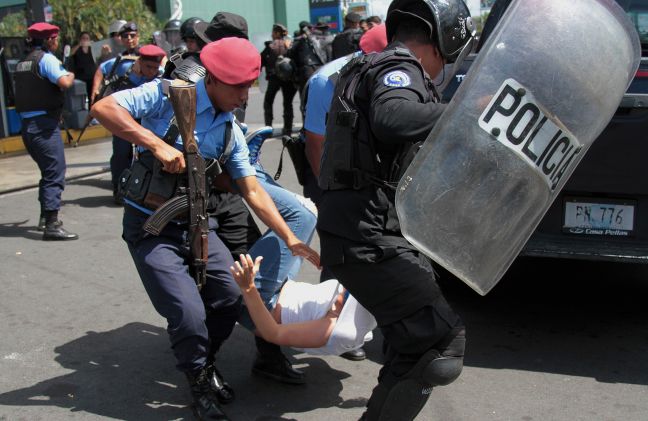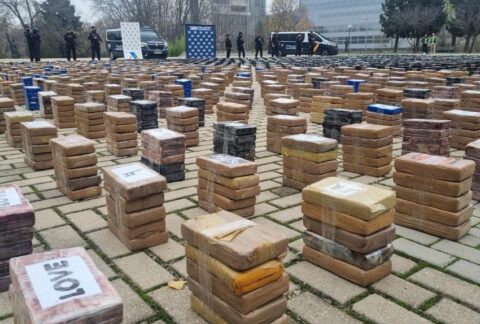According to the Nicaraguan Institute of Tourism, more than 5,000 Cubans arrived in Nicaragua during the first five months of 2019, an increase of almost 900 percent compared to the 566 who arrived in the country in 2018. Far from being attracted to the country’s touristic landmarks, most Cubans are there for covert activities to help President Daniel Ortega and his wife, Vice President Rosario Murillo, remain in power.
On May 30, Nicaraguan newspaper La Prensa reported that 200 advisers from the Cuban Intelligence Directorate operate regularly with the Nicaraguan Armed Forces and provide training to police and Customs and Prison System Directorate officials. Some advisers arrived in the country in 2007, but that number increased exponentially after the April 2018 uprising, which left hundreds of protesters dead, missing, and imprisoned, and led thousands of Nicaraguans to go into exile.
“Cuban strategists are capable of neutralizing internal dissidents in the most brutal way and maintaining the dual Ortega-Murillo dictatorship,” said Jorge Serrano, an academic at the Peruvian Center for Higher National Studies. “Cuba deploys political and military intelligence and counterintelligence advisers in military bases and in key situations for political and economic power in Nicaragua,” Serrano told Diálogo.
Aníbal Toruño, head of Nicaraguan Radio Darío, told Panamanian newspaper Panam that service members fly into the country on commercial flights among Cuban migrants who seek to escape the island and head to the United States. “This is a covert way of sending intelligence agents and advisers allied to Ortega’s service, at a time of increased fear over the idea that sandinismo will remain in power,” he added.
Although the Cuban regime considers Venezuela the crown jewel of resources, Nicaragua is in a strategic geographical location for the interests of the coalition that China, North Korea, Cuba, Iran, Nicaragua, Russia, and Venezuela comprise, Serrano said. “The Caribbean country is the strategic head of an ‘international-continental plan’ that seeks to defend the presence of leftist forces in Latin America to the very end,” he said.
He pointed out that socialist leader Raúl Castro and Cuban Interior Minister Julio César Gandarilla run and operate the political advice strategy of radical, violent, systematic, and selective repression in Nicaragua. He also added that this is the same maneuver Cuban political leaders, military, and intelligence institutions use to support Nicolás Maduro internally. “These strategists do not advise from a distance, they do so onsite.”
During the May 29 forum the Cuba Justice Commission held in San José, Costa Rica, Nicaraguan exiles denounced the increase of Cuban military personnel in repressive operations by the Ortega regime. During this event, former Nicaraguan service member Carlos Zamorán told the commission that the Cuban presence among the Nicaraguan military dates back to 1980. “The military were supposed to be advisers, but they were prepared to torture and kill farmers.”
“Cuba’s behavior in the Western Hemisphere undermines the

security and stability of countries throughout the region,” U.S. Secretary of State Mike Pompeo told the press. “The Cuban regime has for years exported its tactics of intimidation, repression, and violence.”
On November 13, 2018, the Nicaraguan Congress authorized the entry of boats, aircraft, and military personnel from Cuba, Russia, and Venezuela in the second semester of 2019 to train and exchange experiences. The Nicaraguan Army will also be able to deploy military personnel in nations that will send their officers with the same purposes. Every six months, the Nicaraguan government renews the entry of foreign troops and military equipment to the country.
“The diplomatic support Nicaragua receives from Russia, Venezuela, and Cuba severely undercuts international efforts to apply pressure on the Ortega regime,” said the U.S. Center for Strategic and International Studies in its December 2018 report “Lessons from Venezuela for Nicaragua.”
“Although Cuban advisers openly intervene in Nicaragua posing as tourists or covertly, the international community should join efforts to confront and block the Ortega-Murillo regime’s authoritarian actions,” Serrano concluded.









